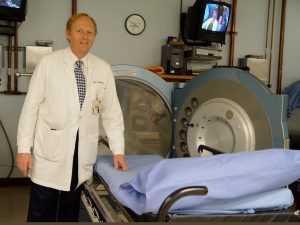New Therapy Reverses Brain Damage in Toddler
 A two-year-old girl who suffered severe brain damage after almost drowning in her family’s swimming pool has almost fully recovered, thanks to an innovative series of oxygen treatments. In February 2016, the Arkansas girl was found without a heartbeat after being submerged in cold water for almost 15 minutes, reports say. She was resuscitated at the Arkansas Children’s Hospital, but could no longer speak, walk, or respond to voices. An MRI revealed deep gray matter injury and cerebral atrophy with gray and white matter loss.
A two-year-old girl who suffered severe brain damage after almost drowning in her family’s swimming pool has almost fully recovered, thanks to an innovative series of oxygen treatments. In February 2016, the Arkansas girl was found without a heartbeat after being submerged in cold water for almost 15 minutes, reports say. She was resuscitated at the Arkansas Children’s Hospital, but could no longer speak, walk, or respond to voices. An MRI revealed deep gray matter injury and cerebral atrophy with gray and white matter loss.
The child’s family consulted Dr. Paul Harch, director of Hyperbaric Medicine at LSU Health New Orleans School of Medicine and an American Board of Physician Specialties® (ABPS) Diplomate in Emergency Medicine. Because hyperbaric oxygen therapy (HBOT), which has been used for near-drowning victims, was not available near the family’s location, Dr. Harch and a team from the University of North Dakota began a bridging therapy. Fifty-five days after the near drowning, they began treating the child with normobaric oxygen – oxygen at sea-level pressure – for 45 minutes, twice a day through a nasal cannula. Not only did the patient became more alert and stop squirming, but she showed neurological improvement that included more hand and arm movement, eye tracking, and short-sequenced speech.
About a month later, the toddler was moved to New Orleans, where Dr. Harch began hyperbaric oxygen treatment in which the patient breathed pure oxygen in a pressurized chamber for 45 minutes a day, five days a week. After 39 sessions, her gait improved and her speech was assessed to be at a level better than before the accident. The young patient also demonstrated near-normal motor function, normal cognition, and improvements on nearly all neurological abnormality tests. At the end of the treatment, 162 days after the near-drowning, MRI scans showed mild residual injury to the patient’s brain, but also a near-complete reversal of cortical and white matter atrophy.
“The startling growth of tissue in this case occurred because we were able to intervene early in a growing child, before long-term tissue degeneration,” said Harch. “Although it’s impossible to conclude from this single case if the sequential application of normobaric oxygen then HBOT would be more effective than HBOT alone, in the absence of HBOT therapy, short-duration repetitive normobaric oxygen therapy may be an option until HBOT is available. Such low-risk medical treatment may have a profound effect on recovery of function in similar patients who are neurologically devastated by drowning.”
Dr. Harch exemplifies the commitment to patient care espoused by the ABPS. Our goal is to give physicians across the nation an opportunity to demonstrate similar dedication and proficiency by earning board certification. To learn more about the eligibility requirements associated with board certification through the ABPS, contact us today.










